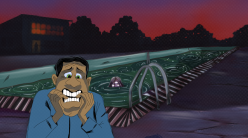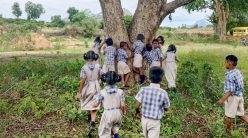The story of SlipDIISc, IISc’s Ultimate Frisbee club
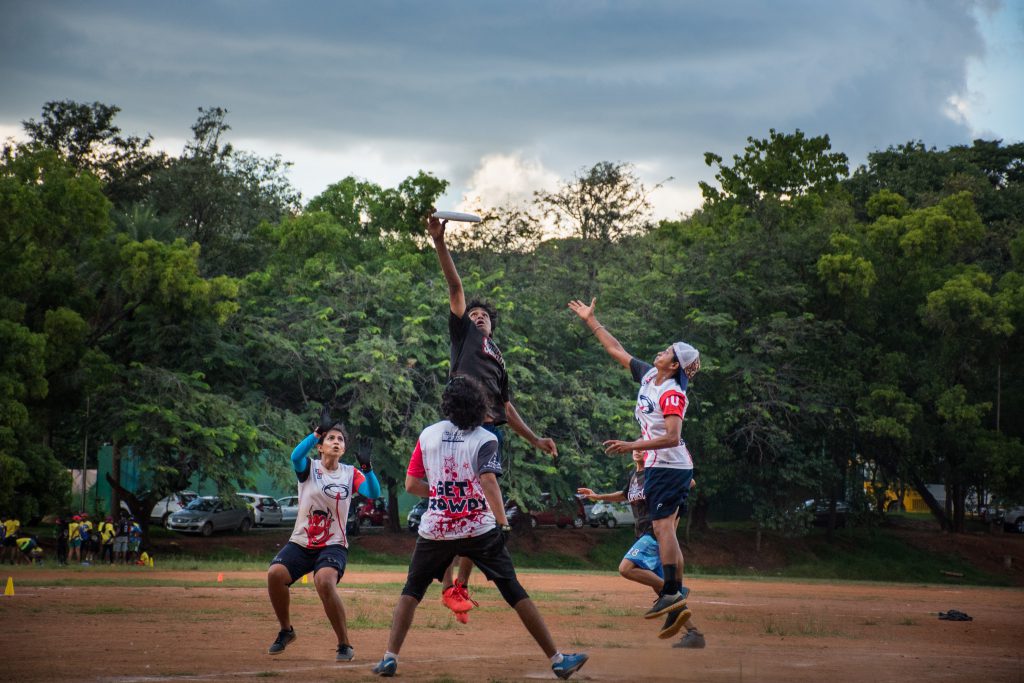
(Photo: Sanjeev Kilarapu)
It was a sunny Saturday afternoon in Bangalore. The Gymkhana cricket ground was crowded with heavily sweating fitness enthusiasts, some of whom jogged all around the field in circles while others walked. Some exercised under the shade of the trees, and some played in groups. The sidewalls bordering the ground offer a place for people to sit and chat in the evenings as they take in the spectacular sunsets beyond the World Trade Centre building in the distance.
Among the people on the ground were a crowd of students running after a flying disc. Looking closer, one could find two groups tossing and catching the disc across the field. The players, all in high spirits, were participating in a session of Ultimate Frisbee – more commonly known as Ultimate – and were members of one of IISc’s most popular clubs, SlipDIISc. This was not an official match, but a practice session, giving a crash course on the sport to newcomers.
The players included Ravi Jambhekar and Devathi Parashuram, both former students of IISc, who keep coming back to campus to play with the group and help motivate the new inductees. Soon after the practice session ended, the groups playing opposite each other shook hands and sat down in a circle to have a friendly discussion about how each of them played and what they could have done differently. They call this the ‘spirit circle’, which is essentially a feedback system woven into the very fabric of the game.
In action, Ultimate is a mix of several sports like football, rugby, and basketball. What makes Ultimate unique is that the game is typically played without any referee. Players are expected to own up to their fouls and games can end with engaging discussions between rival teams. There is, however, a ‘spirit captain’ in each team, who is like a coach and makes sure that the players are playing by the rules.
It is also one of the few mixed-gender sports. “You’ll see top female athletes competing against male athletes at the same game, at the same time,” says Vibhanshu Golia, who is the co-convenor of the IISc team and a UG student. “If you talk about women empowerment and gender equality, I think there’s no other sport that comes as close to Ultimate in that regard.”
[Ultimate] is also one of the few mixed-gender sports
Every team consists of seven players with either four women and three men or vice-versa. Ultimate is played on the field or turf, on a beach, or even indoors. The court is divided into the main playing field in the middle and one end zone at each extreme. Catching the disc in the rival team’s end zone scores a goal for each group. Every team has a mix of two types of players: cutters and handlers. The cutters run behind the disc and help move it across the field by catching and tossing it to other players, and scoring goals by catching the disc in the opponents’ end zone. The handlers are masters of throws and determine the course of the game through their skillful tosses of the disc.
Like Ultimate, several other sports can be played with a flying disc, such as disc golf, flying disc freestyle, disc guts, and so on. The official Indian governing organisation for all flying disc sports, the Ultimate Players Association of India (UPAI), organises tournaments and charts the playing seasons for Ultimate in India. The contests are first at the sectional level, then regional and finally at the national level. SlipDIISc played in the Nationals in 2019, which was the last playing season due to the COVID-19 pandemic. The players are hopeful that the new season will begin later this year.
A trip down memory lane
Cleverly named SlipDIISc, IISc’s official Ultimate team has had an interesting journey. It started in 2015, when Navendu Page, a former PhD student in IISc, and Devathi bought a disc at a beach in Gokarna for Rs 50 and started throwing it around just for fun. They continued playing when they came back to IISc in the short turf between the New Boys Hostel and the New Girls Hostel until the security guard chased them out, and then hit the Gymkhana grounds for their first “official” game. Soon, they found themselves playing together with Ravi, Manvi Sharma and a couple of other students from the Centre for Ecological Sciences. “Slowly, we kept … arm-twisting people into coming and joining us, and at one point, we had 20 people doing throws with that first disc. It was just a fun thing to do in the evenings after we all got out of the labs,” recalls Devathi.
But there was also plenty of pain. Having never played any sport before, most of them were not aware that they had to warm up and cool down before and after playing, and would literally hit the ground running. This led to multiple injuries. Ironically, Devathi ended up suffering from an actual ‘slipped disc’ after eight months of starting to play.
Although the team was reluctant at first to get bound down by rules, they soon decided to seek the help of professional Ultimate players in Bangalore like ‘Airbenders’ from Malleswaram and ‘Learning to Fly’ from Bannerghatta. Later, they started recruitment drives on campus to encourage new members of the IISc community to join their club and play with them.
Ritu Ghanghas, a PhD student in IISc, remembers the one afternoon in her first year that would leave a lasting impact on her life. After finishing her lunch, she came out of the mess to find a small gathering of cheerful faces throwing and catching a flying disc. Intrigued, she moved towards the crowd, and they invited her to try her hand at it. She then started attending the club’s practice sessions to learn more about the sport, and was soon tossing and running after the disc with the other members regularly. She went on to play for the team that represented India at the World Championships in July 2019; the team won a bronze medal. Ritu says that she is grateful to the team members who patiently taught her the game from scratch.
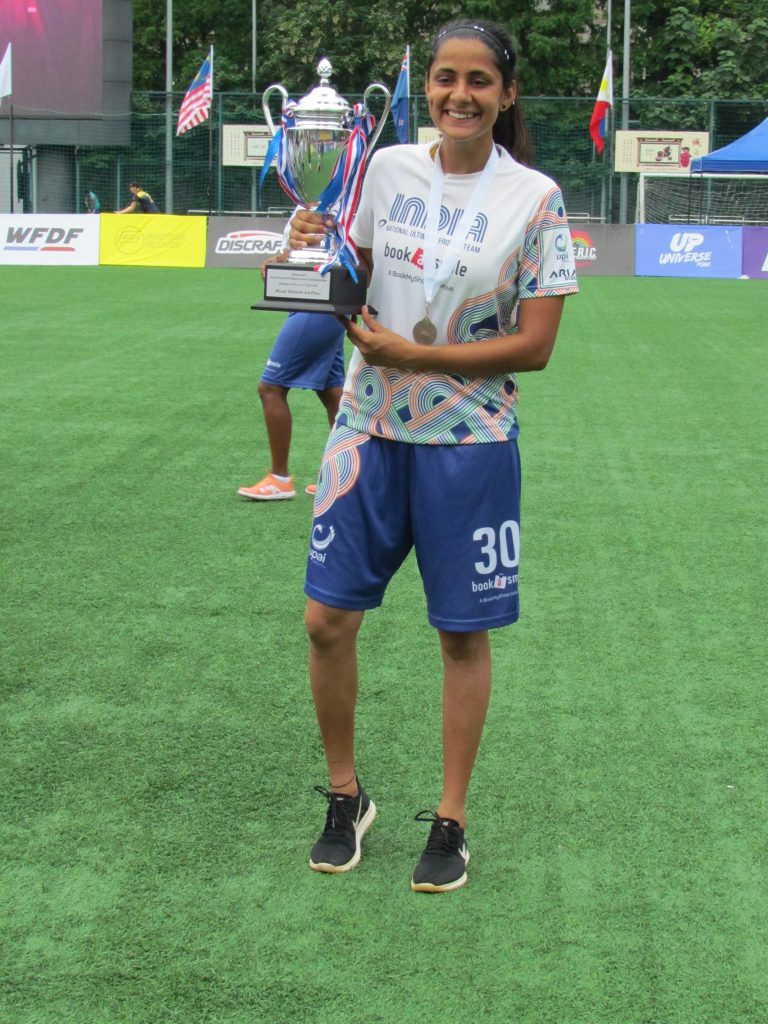
Like Ritu, most of the club members have never played Ultimate before joining the team. Rishi, the current convener of the club and a UG student, says, “Before joining IISc, I knew that kids just throw Frisbee on the beach or parks for fun! I did not know that it was a legit sport that was being played.”
One specific challenge for university teams is the considerable turnover they face year after year. Students remain associated with the Institute for the duration of their degree or project. During this time, they join the clubs on campus and, with practice, become more skilled at the sport. These skilled players are invaluable to the team’s success. However, after their degrees and projects are completed, they move on to other places. This leads to an imbalance of skilled and new players in the team. In SlipDIISc, this results in fewer handlers. Therefore, the senior club members try to teach the newcomers as much as possible before leaving. Despite this turnover, SlipDIISc has strived to stay among the top 15 Ultimate teams in the country for some years now.
SlipDIISc has strived to stay among the top 15 Ulimate teams in the country for some years now
Tours, tournaments and time management
Back in 2015, the club’s founding members did not anticipate that SlipDIISc would become a full-fledged club that would play several tournaments. It was a three-day game hosted in Bangalore called ‘Bangalore Ultimate Open’ that helped them become official. Among the 31 teams participating in the contest, SlipDIISc was the youngest and placed at the last position in the ranking. At that time, they had been playing for only two to three months and had just moved from the stage of casually tossing the disc around to actually trying to play by the rules of the sport. While taking on an experienced Chennai team that was playing for the top five positions in India, they found themselves at the ‘Universe Point’, which serves as a tie-breaker. This novice group of IISc students managed to win the game with their last move and make their first match a huge success. They picked themselves up from the 31st position to the 24th position when the tournament ended after three days.
After that, there was no turning back. SlipDIISc has been participating in many tournaments every year. But this requires serious practice every week. Ritu explains, “Usually we have practice sessions twice a week – Tuesdays and Fridays from 5.30 pm until we have the lights on. We try to have a minimum of two sessions every week, and then we try to schedule one game for the weekend. Either we play amongst ourselves, or we used to invite some outside local teams from Bangalore and have a friendly match.”
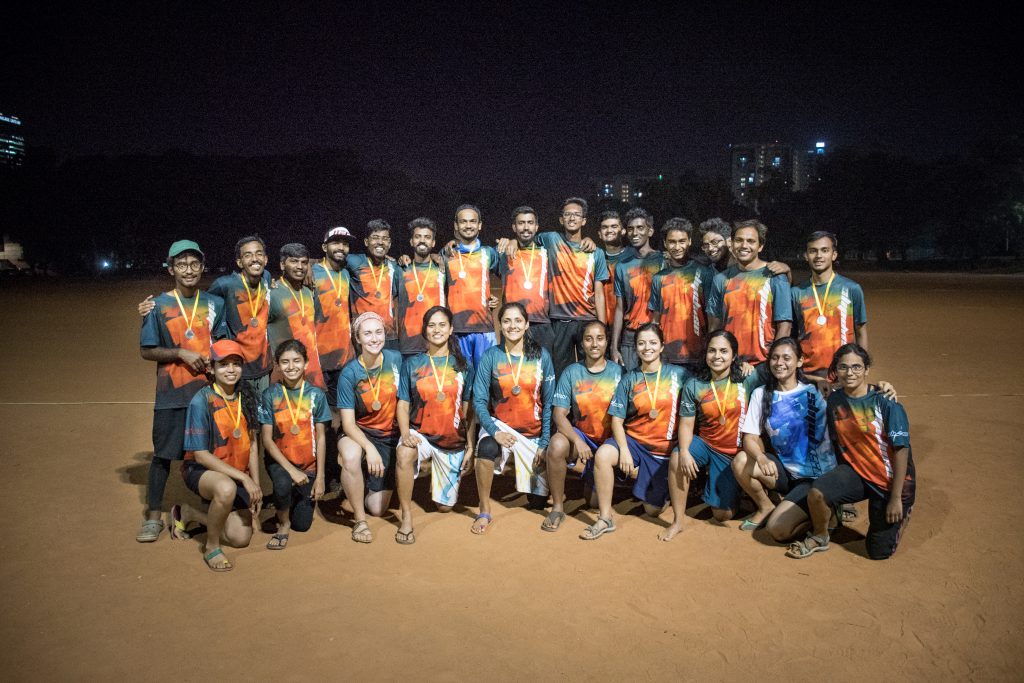
(Photo: Sanjeev Kilarapu)
It can be challenging for some people to fit these practice sessions in their tight academic schedules. However, as Ravi recalls, other than the time he had to go for fieldwork in Goa, he managed to balance work and play quite well. “When I was in IISc, I wouldn’t miss practice at all. From 9 am to 5 pm, I would work, and after 5 pm, I would go to play. My [PhD] guide was very supportive and encouraging … she wouldn’t plan meetings at all after 5 pm, because she knew that I go to play.”
Like their first win, Ravi also remembers another contest they played called ‘Chennai Heat’. This time, SlipDIISc was represented by a lot of newcomers and only a few experienced players. Instead of on turf, like most other matches they had played in, this match was on the beach. Due to the windy weather, the disc kept flying in all directions. The team also struggled to run on the sand and lost the match badly. The students were initially sad, but when they went back to their rooms, they ended up cheering and motivating each other. The event turned out to be a nice bonding experience for the newcomers.
SlipDIISc has also managed to demonstrate its prowess in the World Championship, where Ritu played for India. The club members encouraged her to go for tryouts along with seven other IISc students. There were two rounds of selection. Five of them qualified for the second round, and ultimately only she was selected for the final team to play for India. For the next eight to nine months, she had to practise hard and travel to camps across the country. Finally the team went to Shanghai, China, in July 2019 to play in the tournaments, where they bagged the bronze medal. Ritu says that she came back with a renewed love for the game.
More than just a sport
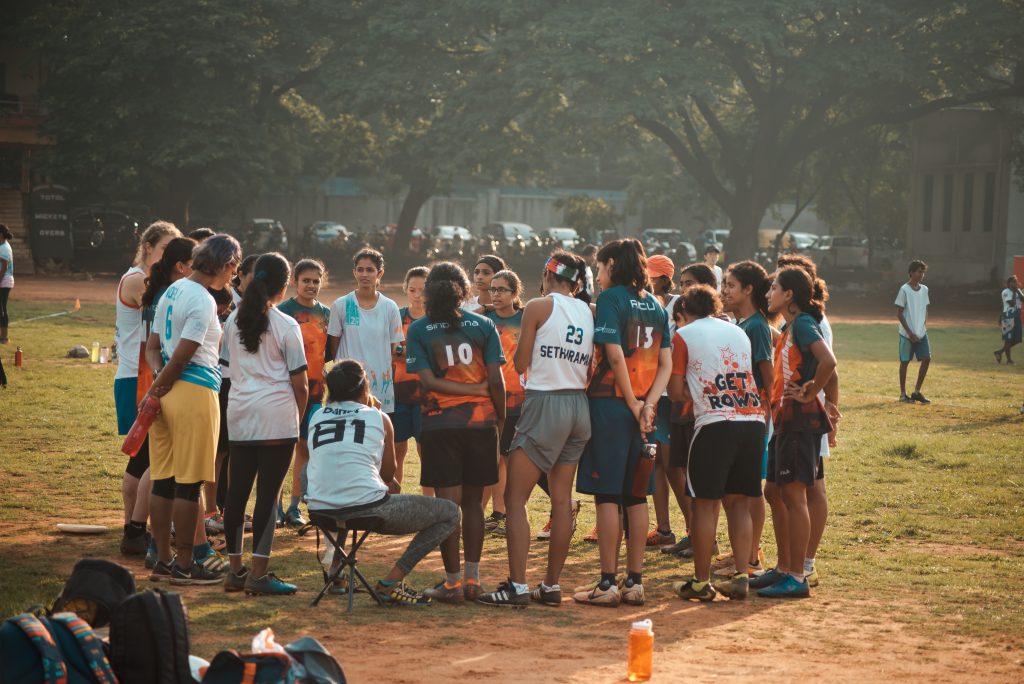
(Photo: Sanjeev Kilarapu)
Members of SlipDIISc also credit the club for helping them stay healthy and fit, and learning valuable life skills. Devathi mentions, “I think most of the leadership skills that I have learned come from [Ultimate] Frisbee. It is useful even in my work.”
Most team members also appreciate the networking and the sense of community that the sport creates. Ravi, who is especially interested in science illustration, says that has benefitted from interacting with designers, filmmakers, teachers, and artists whom he met through this sport.
Devathi adds, “When I went on to do a second Master’s in Cambridge, after I arrived there, I left my suitcases in my student room, and immediately went to play [Ultimate] Frisbee. It’s a great way to make new friends!”
Debraj Manna is a PhD student in the Department of Biochemistry at IISc and a science writing intern at the Office of Communications

